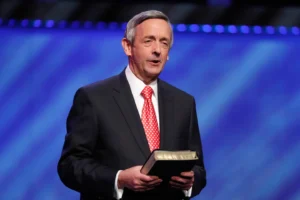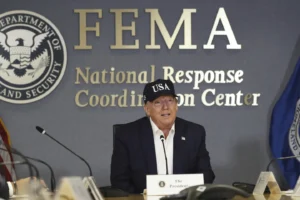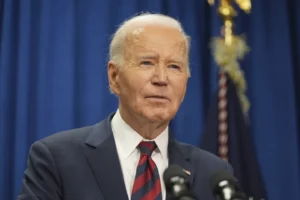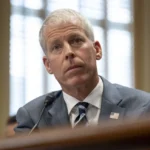No Breakthrough in Debt Ceiling Talks as Default Date Grows Nearer
Wyoming’s representatives in Congress pledged not to vote to increase the debt limit without substantial spending cuts
- Published In: Politics
- Last Updated: May 10, 2023

President Joe Biden described a Tuesday meeting with a bipartisan group of House and Senate leaders as "productive" towards brokering a deal on the debt ceiling, though no agreement has been reached. (AP Photo/Evan Vucci)
By Jacob Gardenswartz
Special to the Wyoming Truth
WASHINGTON — It may sound like something out of a science fiction film, but the “X-date” is real and fast approaching — bringing with it the prospect of global financial catastrophe.
If Congressional leaders and the White House do not reach an agreement to raise the debt ceiling soon, establishing a new cap on the amount of money the U.S. government can borrow, the nation will default in earnest for the first time in its 247-year history. Experts estimate that so-called X-date, when the government will reach the limit of its borrowing, could come as soon as June 1.

At the White House on Tuesday, President Joe Biden hosted the “four corners” of Congress — Senate Majority Leader Chuck Schumer (D-N.Y.), Senate Minority Leader Mitch McConnell (R-Ky.), House Minority Leader Hakeem Jeffries (D-N.Y.) and Speaker of the House Kevin McCarthy (R-Calif.) — in the hopes of hashing out a deal. After roughly an hour of talks, they emerged with few concrete advancements.
“I didn’t see any new movement,” McCarthy told reporters after the meeting. “The progress that’s been made is that we were actually able to meet.”
Biden, conversely, said he viewed the meeting as “productive,” noting in remarks from the Roosevelt Room later that evening that “everyone in the meeting understood the risk of default.”
Still, he conceded no breakthrough agreement was reached. “We agreed to continue our discussions and we’re meeting again on Friday,” Biden told reporters.
Tuesday’s meeting marked the first in-person engagement between Biden and McCarthy since the House last month narrowly passed a measure to raise the debt ceiling while also imposing steep spending cuts. The White House — and Democrats more broadly — have argued any attempt to tie spending cuts to the debt limit amounts to taking the nation’s credit “hostage,” advocating instead for a “clean” debt limit increase with no limits and a separate discussion on spending.
But Republican leaders, Wyomingites among them, have rejected that approach. They’ve pledged not to support any debt limit increase without significant cuts attached to it.
As such, what’s transpired is something of a game of chicken from some of the most powerful men in the world. The nation’s financial order hangs in the balance as they work to reach a deal.
Wyoming representatives dug in on spending cuts
Reaching an agreement on the debt limit will require a complicated balancing act among many stakeholders with different priorities.
All parties agree that at the current moment, the two most responsible for hashing out a deal are Biden and McCarthy. With Republicans maintaining narrow control of the House, and Biden threatening to veto any measure he doesn’t support, McCarthy must walk a thin tightrope to broker a deal that can earn support from his most conservative members as well as from the president.
But any House-passed measure must also earn at least 60 votes in the Senate, meaning despite Democrats’ slim majority in the chamber, the ultimate resolution is likely to be bipartisan. Thus far, the parties appear to be worlds apart.
This week, Wyoming Sens. John Barrasso and Cynthia Lummis joined a letter signed by 41 of their Republican colleagues to Schumer stressing the GOP position that their votes for a debt limit increase are contingent on significant spending cuts.
“The Senate Republican conference is united behind the House Republican conference in support

of spending cuts and structural budget reform as a starting point for negotiations on the debt ceiling,” the lawmakers wrote. “[W]e will not be voting for cloture on any bill that raises the debt ceiling without substantive spending and budget reforms.”
In the House, Rep. Harriet Hageman has positioned herself firmly among those advocating for the most stringent cuts, arguing Biden and the Democrats have gone on a “spending spree” with taxpayers’ money.
“Debt ceilings have traditionally been used as a negotiating tool to rein in spending and pass legislation that may otherwise be stalled,” Hageman said in a statement shortly after the House passed the measure to cut spending and raise the debt limit. “Our current debt ceiling situation should be no different and any effort by Joe Biden to force through a so-called ‘clean debt ceiling increase’ with no spending cuts will be met with a NO vote by me.”
At stake: an unprecedented ‘crisis’
As the two sides remain dug-in on the debt limit issue, the White House has worked to illustrate for Americans just what’s at stake should the government default on its debt.
“It could lead to and trigger a recession. Eight million jobs potentially lost. That is what [Republicans] are threatening,” White House Press Secretary Karine Jean-Pierre told reporters on Tuesday.
“America is not a deadbeat nation,” Biden echoed later in primetime remarks. “We pay our bills and avoiding default is a basic duty of the United States Congress.”
Though the true impact of a debt limit breach remains unclear, financial experts are warning of dire consequences. Even a brief default would bring about a “crisis, characterized by spiking interest rates and plunging equity prices,” according to testimony by Mark Zandi, Chief Economist of Moody’s Analytics. The Bipartisan Policy Center warned of severe impacts on state and local governments’ budgets, while an official with the U.S. Chamber of Commerce stressed that “with each passing day increasing the risk for a misstep resulting in a default.”
So what would a default look like for Wyomingites? In such an unprecedented situation, the real answer is no one knows.
“Wyoming is not unfamiliar with the impacts of gridlock in Washington DC, and we expect the Federal Government to live up to its financial commitments,” Michael Pearlman, Communications Director for Gov. Mark Gordon, told the Wyoming Truth in a statement. “At this point, we have not received any Treasury guidance about what would occur in the event an agreement on the debt ceiling is not reached; however, Wyoming will be prepared.”
Still, Pearlman noted that “federally funded positions could be subject to furloughs after the delivery of remaining federal funding is prioritized for critical program distribution by the US Treasury.” And that’s not to mention the impact on Wyomingites’ stock holdings, pensions and mortgage interest rates.
Legally-dubious but potentially lifesaving last-ditch options
As negotiations between political leaders continue, new efforts are being discussed behind-the-scenes to prevent the worst case scenario.
Constitutionally, the duty to establish the nation’s debt limit falls squarely in the legislative branch; Congress must authorize borrowing and appropriations, while the executive branch handles how money allocated to agencies is spent.
But some in the Biden administration are considering never-before-utilized procedural mechanisms to bypass Congress if a debt limit deal cannot be reached. Such efforts would face legal challenges and carry significant risks.
One long-hypothesized fix involves minting a trillion-dollar coin and depositing it into the nation’s coffers, thereby reducing the debt and opening up more borrowing. As the U.S. Mint is authorized to produce an unlimited number of platinum coins with no restrictions on their face value, such an action would be legally permissible, albeit politically and logistically tricky.
Another idea being discussed is to rely on text in the 14th Amendment to the U.S. Constitution to declare the debt ceiling unconstitutional and eliminate it altogether. Section four notes that “the validity of the public debt of the United States… shall not be questioned.” According to some legal scholars, such language could give the government carte blanche to circumvent the limit.
Asked about that idea, Biden told reporters he’s “considering” it, but noted it would likely be “litigated,” meaning things would “still end up in the same place.”
But McCarthy shot it down. “If you’re the only president and you’re going to go to the 14th Amendment to look at something like that – I would think you’re kind of a failure of working with people across sides of the aisle, or working with your own party to get something done,” he told reporters at the Capitol.













